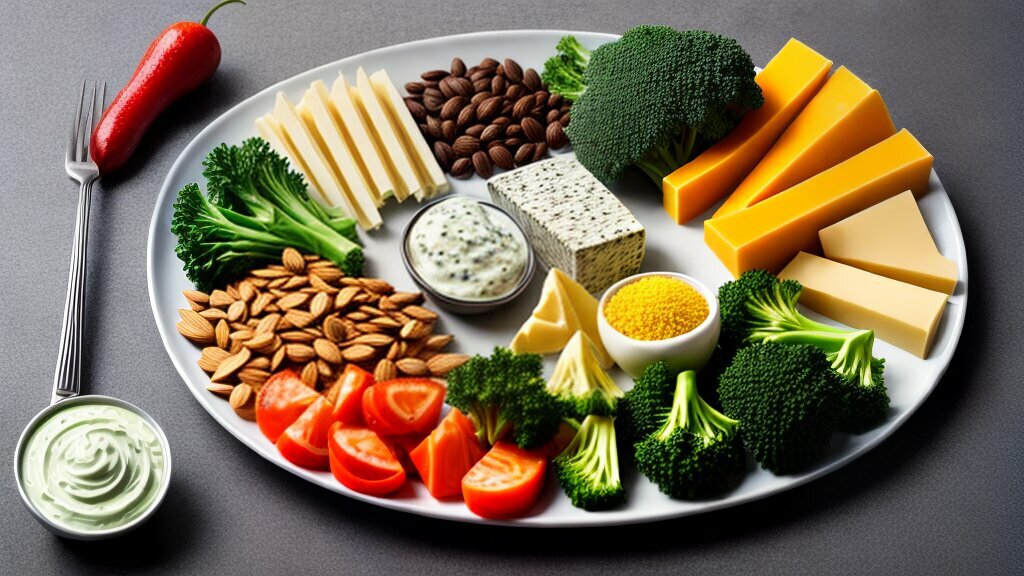If you’re looking to maintain strong and healthy bones, nutrition should be a top priority. Proper nutrition provides the essential nutrients that support bone development and prevent bone-related diseases. In this guide, we’ll cover the key nutrients and foods that promote bone health, as well as tips on creating a bone-healthy diet.
Key Takeaways:
- Nutrition plays a crucial role in maintaining optimal bone health.
- Calcium, vitamin D, and other bone-supportive nutrients are essential for strong bones.
- A bone-healthy diet should include a variety of nutrient-rich foods.
The Role of Nutrition in Bone Health
Your bones are vital for physical activity and movement, but did you know that proper nutrition plays a crucial role in maintaining strong bones? A diet rich in essential nutrients is necessary for optimal bone health throughout your life.
Calcium, vitamin D, and other bone-supportive nutrients are essential for building and maintaining strong bones. Without enough of these nutrients, bones can become weak and prone to fractures and other injuries.
Calcium is a key nutrient for building and maintaining bone density. Your body needs adequate amounts of calcium to build strong bones, and if you don’t get enough from your diet, your body will take calcium from your bones, making them weaker over time.
Vitamin D is important for the absorption of calcium and for proper bone development. Without enough vitamin D, your body cannot effectively absorb the calcium you consume, no matter how much you eat. It’s essential to get enough vitamin D from your diet or from sunlight exposure to support your bone health.
A diet lacking in essential bone-supportive nutrients can lead to osteoporosis, a condition where bones become weak and brittle, increasing the risk of fractures and other injuries. Good nutrition is key to preventing osteoporosis and maintaining strong bones throughout your life.

Remember, proper nutrition and a bone-healthy diet are essential for maintaining strong and healthy bones. Always consult with a healthcare professional before starting any supplements or making significant changes to your diet.
Calcium-Rich Foods for Strong Bones
Calcium is essential for maintaining strong bones. It helps to build and maintain bone strength, which is crucial for preventing fractures and osteoporosis later in life. It is recommended that adults consume 1000-1200mg of calcium daily, depending on age and gender.
Here are some calcium-rich foods that you can incorporate into your diet:
| Food | Calcium Content (per serving) |
|---|---|
| Low-fat dairy products (milk, cheese, yogurt) | 300-400mg |
| Tofu | 130-350mg |
| Sardines (canned with bones) | 300mg |
| Leafy green vegetables (kale, broccoli, bok choy) | 90-180mg |
| Fortified foods (cereal, orange juice) | 100-1000mg |
It’s important to note that some foods that are high in calcium, such as spinach and Swiss chard, also contain compounds that can inhibit calcium absorption. To ensure optimal calcium absorption, pair calcium-rich foods with vitamin-D-rich foods, such as fatty fish, egg yolks, and fortified milk or juice.
Incidental physical activity can also promote calcium absorption, so be sure to stay active throughout the day.

Make sure you’re incorporating enough calcium-rich foods into your diet to support strong bones!
Vitamin D and Bone Health
Another essential nutrient for bone health is vitamin D. Vitamin D plays a key role in calcium absorption and bone development. It is also linked to improved muscle function, which can also contribute to better bone health.
One of the primary ways to get vitamin D is through sunlight exposure. When your skin is exposed to sunlight, it triggers the body to produce vitamin D. However, in Australia, many people are at risk of vitamin D deficiency due to lack of sun exposure and the use of sunscreen.
In addition to sunlight, there are some natural food sources of vitamin D, including fatty fish like tuna and salmon, egg yolks, and fortified foods like milk, orange juice, and cereal. If you are not getting enough vitamin D from sunlight or your diet, supplements can be used to support bone health.
It is important to note that too much vitamin D can be harmful, so it’s best to work with a healthcare professional to determine the appropriate dosage for your needs.

Bone-Strengthening Diet
Creating a bone-strengthening diet is essential for maintaining strong and healthy bones. Apart from calcium and vitamin D, there are other bone-supportive nutrients that you should include in your diet.
Calcium-Rich Foods
Calcium is the foundation of bone health, and it is essential to include calcium-rich foods in your diet. Incorporating foods such as dairy products, leafy greens, tofu, and fortified foods can help you meet your daily calcium requirements.
| Food | Serving Size | Calcium Content (mg) |
|---|---|---|
| Yogurt (plain, non-fat) | 1 cup | 415 |
| Kale (cooked) | 1 cup | 179 |
| Tofu (firm, with calcium) | 1/2 cup | 434 |
| Fortified orange juice | 1 cup | 350 |
It is recommended that adults should aim for 1000-1200mg of calcium per day, depending on age and gender.
Vitamin D Sources
Vitamin D plays a crucial role in maintaining bone health. You can get vitamin D from sunlight exposure as well as certain foods such as fatty fish, egg yolks, and fortified products. However, it can be challenging to get enough vitamin D from diet alone, especially during winter months. Consider taking a supplement to meet your daily vitamin D requirements.
| Food | Serving Size | Vitamin D Content (IU) |
|---|---|---|
| Salmon (cooked) | 3.5 ounces | 447 |
| Egg yolk (cooked) | 1 large | 41 |
| Fortified milk | 1 cup | 120 |
Other Bone-Supportive Nutrients
Other nutrients that can help maintain bone health include protein, magnesium, vitamin K, and vitamin C. You can get protein from lean meat, fish, nuts, and legumes. Magnesium can be found in whole grains, nuts, and dark leafy greens. Vitamin K can be sourced from leafy greens, while vitamin C can be obtained from fruits and vegetables.
When planning your meals, aim for a variety of foods that are rich in these nutrients to support your bone health.

Incorporating a wide range of bone-supportive nutrients and foods into your diet is crucial for maintaining strong and healthy bones. Make a conscious effort to include calcium-rich foods, vitamin D sources, and other bone-supportive nutrients in your meals to support optimal bone health.
Bone Health Supplements
While a healthy diet rich in bone-supportive nutrients should be the primary source of nutrition for bone health, supplements can provide additional support when necessary. It is important to note that supplements should not replace a balanced diet, and consulting with a healthcare professional is recommended before starting any new supplements.
| Supplement | Function | Food Sources |
|---|---|---|
| Calcium | Supports bone density and strength | Dairy products, leafy greens, nuts, seeds, and fortified foods |
| Vitamin D | Helps the body absorb calcium | Fatty fish, egg yolks, and fortified foods |
| Magnesium | Plays a role in bone metabolism and density | Nuts, seeds, legumes, whole grains, and leafy greens |
When choosing supplements, it is important to select high-quality products from reputable sources. Look for supplements that have been third-party tested for purity and potency. It is also important to follow dosage instructions and not exceed the recommended daily intake for each supplement.
Remember, while supplements can provide additional support for bone health, they should not replace a balanced and varied diet rich in bone-supportive nutrients.

Conclusion
Now that you understand the crucial role that nutrition plays in maintaining strong and healthy bones, you can take actionable steps towards supporting your bone health. Remember to include calcium-rich foods, vitamin D sources, and other bone-supportive nutrients in your meals to ensure you are meeting your daily requirements.
Creating a bone-strengthening diet may seem overwhelming, but by planning your meals and incorporating a variety of nutrient-dense foods, you can achieve optimal bone health. Additionally, supplements can provide added support, but it is important to consult with a healthcare professional before starting any supplements.
Make bone health a priority and invest in your overall health and well-being. By prioritizing your nutrition, you can enjoy a healthier and more active lifestyle for years to come.
FAQ
Q: Why is nutrition important for bone health?
A: Nutrition plays a crucial role in maintaining strong and healthy bones. Adequate intake of essential nutrients, such as calcium and vitamin D, is necessary for optimal bone development and overall bone health.
Q: What are some calcium-rich foods for strong bones?
A: Some calcium-rich foods that promote strong bones include dairy products (milk, cheese, yogurt), leafy green vegetables (spinach, kale), tofu, almonds, and fortified plant-based milk alternatives.
Q: How does vitamin D impact bone health?
A: Vitamin D helps the body absorb calcium and promotes proper bone development. It is essential for maintaining strong bones. Natural sources of vitamin D include sunlight, fatty fish (salmon, mackerel), eggs, and fortified foods.
Q: What is a bone-strengthening diet?
A: A bone-strengthening diet includes a variety of nutrients and foods that support bone health. It incorporates calcium-rich foods, vitamin D sources, and other bone-supportive nutrients. It is important to include a balanced mix of fruits, vegetables, whole grains, lean protein, and healthy fats.
Q: Should I consider taking bone health supplements?
A: Supplements can provide additional support for bone health; however, it is important to consult with a healthcare professional before starting any supplements. They can guide you on choosing high-quality supplements that are appropriate for your specific needs.
Q: What is the significance of nutrition for bone health?
A: Nutrition is essential for maintaining optimal bone health. By prioritizing proper nutrition and making informed choices, you can support your bone health and enjoy a healthier and more active lifestyle.
